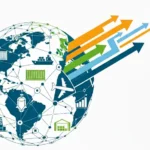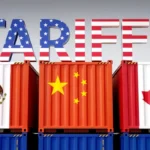Latest Posts
September 11, 2025 Continuing Education in Global Logistics: A Powerful Catalyst for Career Growth
June 30, 2025
Continuing Education in Global Logistics: A Powerful Catalyst for Career Growth
June 30, 2025
 Tariffs: The Upside
June 30, 2025
Tariffs: The Upside
June 30, 2025
 Exploring the Role of Intrapreneurs: Innovation Drivers Within Organizations
Exploring the Role of Intrapreneurs: Innovation Drivers Within Organizations
Newsletter
Sign up to receive email updates from the Freightpath.
"*" indicates required fields
Navigating Through Time: A Journey into the History of Freight Forwarding
June 10, 2024
Freight forwarding, an essential component of global trade and commerce, has a rich history dating back centuries. From its humble beginnings as a means of facilitating the transportation of goods to its evolution into a sophisticated industry connecting businesses worldwide, the history of freight forwarding reflects the evolution of trade routes, transportation technologies, and economic systems. In this exploration, we’ll embark on a journey through time, tracing the origins, milestones, and transformations that have shaped the fascinating history of freight forwarding.
1. Origins of Freight Forwarding:
The roots of freight forwarding can be traced back to ancient civilizations where merchants relied on intermediaries to facilitate the movement of goods across vast distances. In ancient Mesopotamia, for example, merchants utilized caravan routes and river networks to transport goods, often relying on middlemen to coordinate logistics and navigate trade routes.
2. Development of Trade Routes:
As trade networks expanded and civilizations flourished, the demand for efficient transportation and logistics solutions grew. The Silk Road, a network of trade routes connecting Asia with Europe, played a pivotal role in facilitating the exchange of goods, ideas, and cultures between the East and the West. Merchants and traders along the Silk Road relied on caravan leaders and intermediaries to navigate the treacherous terrain and overcome logistical challenges.
3. Emergence of Maritime Trade:
With the rise of maritime exploration and the Age of Discovery in the 15th and 16th centuries, maritime trade emerged as a dominant force in global commerce. European explorers such as Christopher Columbus, Vasco da Gama, and Ferdinand Magellan pioneered new sea routes to Asia, Africa, and the Americas, ushering in an era of unprecedented global connectivity. Freight forwarders played a crucial role in coordinating the shipment of goods across oceans, navigating complex maritime routes, and managing logistics operations.
4. Industrial Revolution and Modernization:
The Industrial Revolution of the 18th and 19th centuries brought about significant advancements in transportation and logistics technology, transforming the landscape of freight forwarding. The invention of steam-powered ships, railways, and later, motorized vehicles revolutionized the movement of goods, making transportation faster, more efficient, and accessible on a global scale. Freight forwarders adapted to these technological innovations, embracing new methods of transportation and expanding their services to meet the evolving needs of businesses.
5. Rise of Modern Freight Forwarding Industry:
The 20th century witnessed the consolidation and professionalization of the freight forwarding industry, driven by globalization, technological advancements, and the growth of international trade. Established freight forwarding companies emerged, offering comprehensive logistics solutions, including freight consolidation, customs clearance, warehousing, and distribution. The advent of containerization in the 1950s further revolutionized the industry, streamlining cargo handling processes and reducing costs.
6. Technological Revolution and Digitalization:
The advent of the internet and digital technologies in the late 20th and early 21st centuries ushered in a new era of transformation for the freight forwarding industry. Electronic data interchange (EDI), transportation management systems (TMS), and cloud-based logistics platforms revolutionized supply chain management, enabling real-time tracking, visibility, and collaboration across global networks. Freight forwarders embraced digitalization, leveraging technology to enhance efficiency, transparency, and customer service.
7. Challenges and Opportunities in the 21st Century:
In the 21st century, the freight forwarding industry faces a myriad of challenges and opportunities amid rapid globalization, geopolitical shifts, and technological disruptions. Rising trade tensions, regulatory complexities, and environmental concerns pose significant challenges for freight forwarders, requiring adaptability and resilience in an ever-changing landscape. At the same time, emerging technologies such as blockchain, artificial intelligence, and automation present new opportunities for innovation and efficiency in freight forwarding operations.
8. Future Trends and Prospects:
Looking ahead, the future of freight forwarding is shaped by ongoing technological advancements, changing consumer preferences, and geopolitical dynamics. Trends such as sustainability, e-commerce, and supply chain resilience are expected to influence the trajectory of the industry, driving demand for agile, sustainable, and digitally-enabled logistics solutions. Freight forwarders will continue to play a critical role in facilitating global trade, connecting businesses and markets across borders, and driving economic growth and prosperity.
In conclusion, the history of freight forwarding is a testament to the ingenuity, resilience, and adaptability of human civilization in overcoming logistical challenges and facilitating the exchange of goods and ideas across borders. From ancient trade routes to modern-day logistics networks, freight forwarding has evolved into a sophisticated industry that underpins global trade and commerce. As we navigate the complexities of the 21st century, the legacy of freight forwarding continues to shape the future of global connectivity, driving innovation, collaboration, and prosperity in an increasingly interconnected world.
CEO @ FreightPath Inc. | CSCMP Corporate Member | We Deploy The Industry’s Most Comprehensive Global Supply Chain Curriculum | 500+ Course Library | gofreightpath.com/course-catalog
